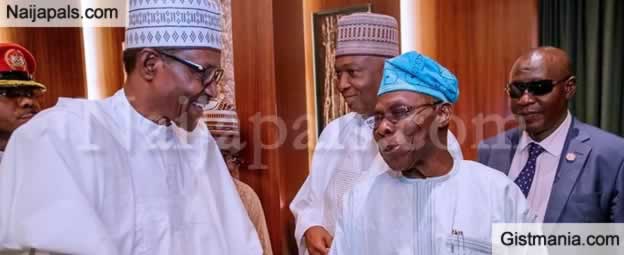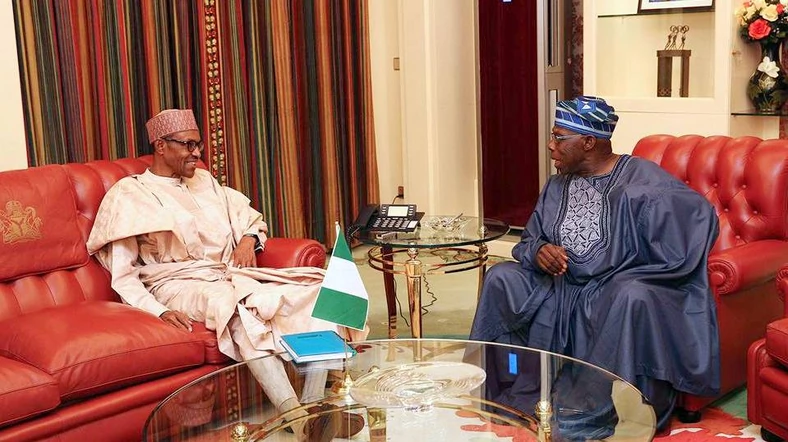
President Muhammadu Buhari has assured doubting Nigerians that a third term in office or a constitutional amendment that will yield one, is not how he wants to be remembered.
Former President Olusegun Obasanjo’s third term bid collapsed on the floor of the senate on May 16, 2006 after lawmakers threw out the constitutional amendment bill.
Legislators were also financially induced to amend the constitution for Obasanjo at the time, according to sundry reports.
The rumours that started it all
There have been speculations in the social media that Buhari, whose constitutionally permissible second term in office elapses on May 29, 2023, is set to borrow from the Obasanjo playbook, but the president says he will never go down that route of infamy.
Buhari said in a statement issued by his Senior Special Assistant on Media and Publicity, Garba Shehu, on the nation’s Independence Day.
“President Buhari intends to serve his full second elected term in office, ending 2023 – and then there shall be a general election in which he will not be a candidate.
“There is not even the faintest possibility that this will change.”
The Obasanjo dig
The presidency also had a dig at Obasanjo who has emerged a foremost critic of the Buhari administration.
Obasanjo had warned Buhari not to seek a second term in office in January of 2018.
“President Buhari is a democrat. He respects the constitution. Any activity aimed at altering the two-term limit will not succeed and shall never have his time nor support,”

How Obasanjo's third term bid went down
In their book:
According to the authors, there was an offer of N50 million for each member of the House and N75 million for each senator who was ready to vote for the tenure extension amendment.
“Within the House of Representatives, there were several caucuses across interests, geography and parties. For instance, there was the Unity Forum led by David Idoko. Under the guise of advocating for the unity of Nigeria, this group of legislators sought to drive support for the Third Term Agenda within the public and amongst legislators. In return, many of them were reportedly well rewarded.
“These foot soldiers committed to the glory of a third term, an ode to Obasanjo’s now personal god complex, worked towards their goal with the aid of various strategies guided by Obasanjo’s mechanical engineering mind. What was needed? Who was needed? Who could be bullied or bought?
“Some of the strategies were familiar and had been used by other self-succession artists. The key tool was incentives – the trade by barter that had worked so well in keeping elite support for military rule for over 29 years.
“Positions were offered. Sitting governors, for example, would enjoy tenure elongation as well and several loyalists from the North had been promised that they would become Obasanjo’s vice president during his third term.
“Financial reward was also a huge inducement. The most credible figure for members of the National Assembly was N50 million for each member of the House and N75 million for each senator who would vote for the tenure extension amendment,"
Obasanjo continues to deny that he sought to tinker with the nation's constitution in order to elongate his stay in office.
Obasanjo and Buhari were military presidents at different times in the '70s and '80s.
| Posted: at | |




 TRENDING GISTS
TRENDING GISTS  UK Police Recover Body Of 16Yr Old British-Nigerian Boy Who Drowned In A Lake
UK Police Recover Body Of 16Yr Old British-Nigerian Boy Who Drowned In A Lake PHOTOS: Young Woman Brutally Murdered By Suspected Ritualists, Priv@te Part Removed In Ogun
PHOTOS: Young Woman Brutally Murdered By Suspected Ritualists, Priv@te Part Removed In Ogun Lovely Video Of Singer Davido And His Wife, Chioma Vibing To His Song
Lovely Video Of Singer Davido And His Wife, Chioma Vibing To His Song Woman Slams Her Husband For Allegedly Having Unprotected S3x With Random Girls After Publicly Apologizing To Her
Woman Slams Her Husband For Allegedly Having Unprotected S3x With Random Girls After Publicly Apologizing To Her Actress, Laide Bakare Crowned UN Ambassador Of Peace
Actress, Laide Bakare Crowned UN Ambassador Of Peace Actress, Uche Montana Celebrates Birthday With New Stunning Photos
Actress, Uche Montana Celebrates Birthday With New Stunning Photos VIDEO: President Tinubu Conferred With a Chieftaincy Title in Anambra State
VIDEO: President Tinubu Conferred With a Chieftaincy Title in Anambra State Passengers Killed, Vehicles Set Ablaze As Gunmen Attack Commercial Bus in Imo
Passengers Killed, Vehicles Set Ablaze As Gunmen Attack Commercial Bus in Imo